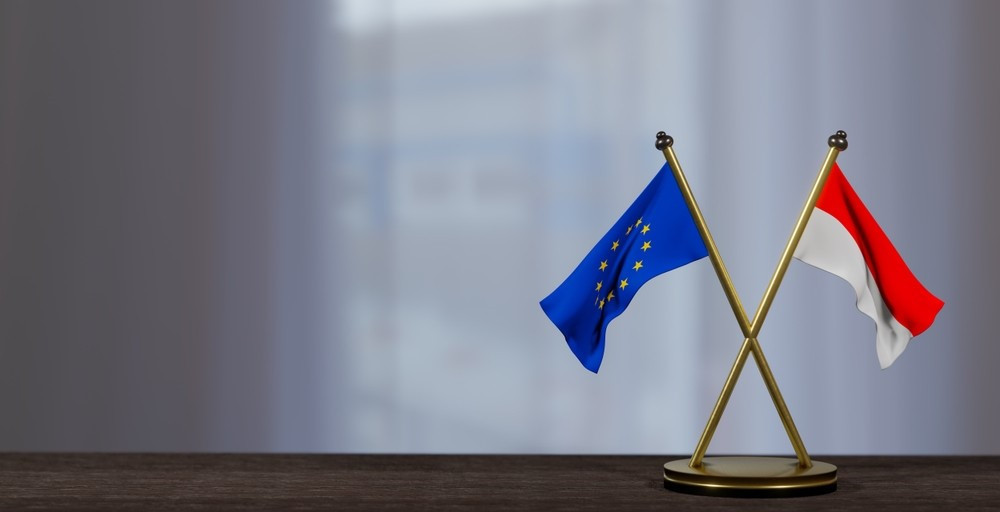News
Amid Trump tariffs, Indonesia, EU settle differences to boost trade
Tenggara Strategics August 1, 2025 An illustration of Indonesian and European Union flags on a table (Shutterstock/Fly Of Swallow Studio)
An illustration of Indonesian and European Union flags on a table (Shutterstock/Fly Of Swallow Studio)
The resurgence of global trade uncertainty under United States President Donald Trump’s second term has prompted Indonesia and the European Union to resolve long-standing disputes and accelerate the conclusion of negotiations on the Indonesia-EU Comprehensive Economic Partnership Agreement (IEU-CEPA), aiming to finalize the deal by September. However, significant hurdles remain, particularly Indonesia’s compliance with the EU’s anti-deforestation regulations.
During a recent visit to Brussels, President Prabowo Subianto and European Commission President Ursula von der Leyen signed a political agreement to wrap up the decade-long IEU-CEPA talks, now entering their final phase. Many analysts view the signing as a direct response to the growing uncertainty in global trade sparked by the return of Trump-era tariffs.
Prabowo also secured a separate trade deal with Trump, reducing US tariffs on Indonesian goods from 32 percent to 19 percent, albeit after making substantial concessions. In contrast, Von der Leyen is still negotiating with Washington, with no breakthrough yet.
Prabowo’s leadership in pushing the 19 rounds of IEU-CEPA negotiations, launched in 2016, toward completion has been widely praised. The most contentious issues have been the EU’s restrictions on Indonesian palm oil and Indonesia’s ban on nickel ore exports. Both have been escalated to the World Trade Organization, but it is still unclear which side is conceding more ground.
Encouragingly, the IEU-CEPA will eliminate tariffs on up to 80 percent of Indonesian exports to the EU, including palm oil. Yet, the biggest challenge will be navigating non-tariff barriers such as the EU Deforestation Regulation (EUDR), which remains in place. Indonesian Palm Oil Producers Association (GAPKI) chairman Eddy Martono warned that despite tariff relief under the IEU-CEPA, the EUDR poses a serious hurdle for palm oil entering the European market.
Under the EUDR, Indonesia is classified as a “standard-risk” country for deforestation, alongside fellow palm oil giant Malaysia. This designation requires Indonesian palm oil exports to undergo strict sustainability and traceability checks that could disproportionately impact independent smallholder farmers. As a result, Indonesia must strengthen its compliance mechanisms if it wants to continue accessing the EU market. While challenging, this also presents an opportunity to innovate and lead in sustainable agribusiness.
Palm oil remains a cornerstone of Indonesia’s export economy, generating US$27.8 billion in export revenue last year, down slightly from $30.3 billion the year prior. Once a major buyer, the EU has become a less significant destination due to growing regulatory barriers, prompting Indonesia to shift more of its palm oil exports to Asian markets, particularly China and India.
Still, the IEU-CEPA represents a strategic breakthrough. At a time of mounting trade fragmentation, the EU remains one of Indonesia’s most important trading partners and foreign investors. According to European Commission data, bilateral trade reached 27.3 billion euros ($32.2 billion) in 2024, with Indonesia recording a surplus of 7.8 billion euros. From 2021 to 2023, EU member states invested a combined $39 billion in Indonesia, second only to Singapore.
The agreement allows Indonesia to maintain preferential access to a key export market while preserving its sizable trade surplus, an outcome it has struggled to replicate in the US, where its trade surplus has drawn Trump’s ire. The EU, with imports double the volume of the US imports from Indonesia, is also eager to secure access to Indonesia’s critical minerals, including nickel, essential for its clean technology ambitions. This mutual interest could spur sustainable investment in mining and processing.
The IEU-CEPA also paves the way for Indonesia to diversify its exports and embed them within a framework of sustainable trade, consistent with the country’s long-term commitment to the United Nations Sustainable Development Goals (SDGs). In an increasingly fractured global trade environment, Indonesia's ability to balance short-term concessions with long-term partnerships will shape its economic future. Most importantly, the agreement reaffirms Indonesia’s and the EU’s shared commitment to a multilateral, rules-based trading system.

